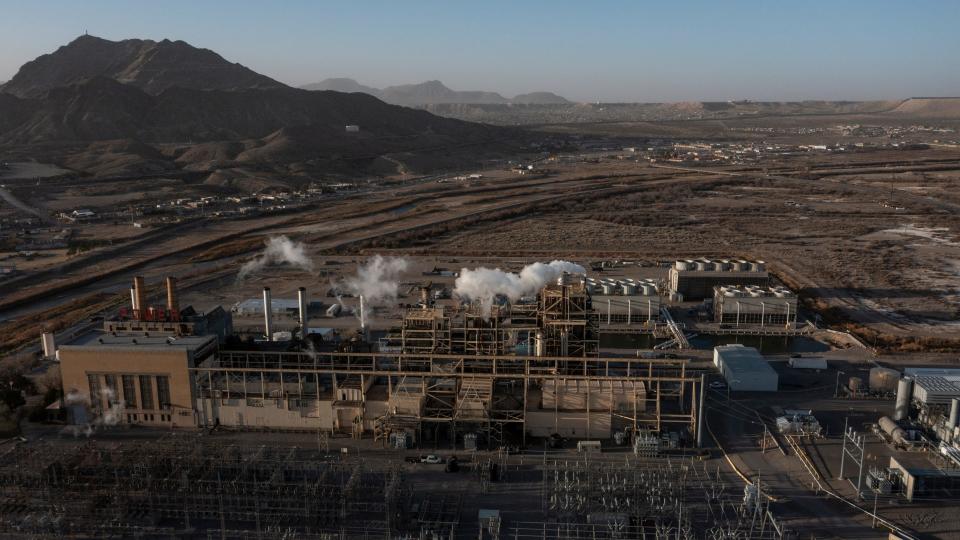Climate charter proponents target criticism from El Paso business chambers
Sunrise El Paso and Ground Game Texas, the groups behind the proposed El Paso Climate Charter, said they want to set the record straight after a round of criticism and opposition from the El Paso Chamber and the El Paso Hispanic Chamber of Commerce.
The El Paso Chamber recently announced its opposition to the charter, which will appear on the May 6 ballot as Proposition K, following an economic impact study it commissioned that showed the climate charter will cost thousands of jobs and billions in earnings and economic output.
The Hispanic chamber followed suit shortly thereafter, releasing survey results showing the vast majority of its membership also opposes the charter.
While the Hispanic chamber did not announce its own opposition to the charter, it turned out for a recent news conference, alongside the El Paso Chamber, former Mayor Dee Margo, former city Rep. Claudia Rodriguez and Republican U.S. Rep. Tony Gonzales, who represents a portion of El Paso County, to rally opposition to the proposal.
More:Majority of Hispanic Chamber of Commerce members oppose El Paso Climate Charter
The activist groups assert that the findings of the El Paso Chamber's economic impact study and the Hispanic chamber's survey are flawed and have fundamentally mischaracterized the actual tenets of the proposed climate charter.
“The El Paso Hispanic Chamber of Commerce has produced an illegitimate survey that mischaracterizes the climate charter and misleads surveyed business owners into believing disinformation about Proposition K," Sunrise El Paso Communications Coordinator Christian Marquardt said in a statement.
For Mike Siegel, political director for Ground Game Texas, the chambers' connection to the fossil fuel industry continues to cast a shadow over any findings they present related to the climate charter.
“The climate charter establishes positive goals including building solar on city buildings and creating jobs for a sustainable, renewable energy economy," Siegel said in a news release. "Both El Paso Chamber’s study and the Hispanic Chamber’s survey are filled with fabrications and are funded by big oil interests that want to prevent El Paso from taking meaningful climate action.”
In a 10-page report, activists broke down what they called the "false, inaccurate conclusions" presented in the El Paso Chamber's study and the Hispanic chamber's survey results.
Charter will not force switch in appliances, move to electric vehicles
In both the Hispanic chamber's survey and the El Paso Chamber's economic impact study, the assertion is made that households and businesses will incur enormous costs because of a requirement that gas appliances be swapped out for electric.
The El Paso Chamber's study claimed that the city will see "$3.7 billion in electrification costs as households and businesses exchange natural gas devices and appliances with those suited for electric use," while the Hispanic chamber has claimed that "truck companies would have to make their fleet of vehicles to electric cars which would cost billions of dollars.”
A Closer Look:What's the true cost of Climate Charter in El Paso? Chamber study starts debate on cost-benefit tradeoffs
However, the proposed climate charter does not include any language requiring household appliances or vehicles to be exchanged for electric ones.
In the section on Renewable Energy Goals, the climate charter states that “the city of El Paso shall employ all available methods to require that energy used within the city is generated by clean renewable energy, with the goals of requiring (1) 80% clean renewable energy by 2030 and (2) 100% clean renewable energy by 2045.”
"This language in the policy refers to the energy sourcing of El Paso’s electrical grid – whereas the Chamber describes households and small businesses as responsible for this transition to clean renewable energy," the news release stated. "The onus is placed on El Paso Electric Co. to transition our grid effectively, efficiently, andequitably to clean renewable energy."
Marquardt, in the news release, added: "The Climate Charter enforces a transition to clean renewable energy generated from our electrical grid, not specific to heating generation, which means El Pasoans would not need to transition to electric appliances, as this is simply not part of the climate charter measure. The onus is on our electric utility, El Paso Electric Co., who must make big changes and shut down their polluting, climate-destroying, asthma-causing gas plants as quickly as possible. EPE should follow through with their promise to transition El Paso’s energy generation to 100% clean renewable energy by 2045.”
Where electric vehicles are concerned, climate charter supporters have noted that the proposal "does not state, or even remotely suggest, a transition to electric vehicles in any capacity."
Climate charter called aid for small and family businesses
Another claim that has been made by both chambers ‒ and is being contested by climate charter proponents ‒ is that small and family-owned businesses will suffer if the El Paso Climate Charter is approved by voters.
“If this amendment is approved, El Paso will regress and no business will want to relocate to El Paso," one respondent to the Hispanic chamber survey said. "Businesses may even leave El Paso and move into the county, this amendment is not what El Paso needs to move toward moving forward with climate change.”
In its executive summary, the El Paso Chamber's study found that there would be "business closures in the city due to a lack of compliance and the potential for more bureaucracy within the local government which could stunt growth."
Possible benefit to small businesses
But, again, activists assert that the climate charter would actually benefit small businesses by getting the city "closer to reduced electricity rates overall," increasing "the affordability of rooftop solar" and protecting "small businesses/family businesses as a community which should not be disproportionately burdened by the transition to renewable energy."
The charter calls for the city to "employ all available efforts to convert El Paso Electric to municipal ownership," a process that would not take place right away and instead be worked toward over several years, which advocates say would cut energy costs in the city.

In the news release, the authors of the climate charter cited an American Public Power Association study, which found that “residential customers of public power utilities pay monthly bills that are on average 4% less than customers of investor-owned utilities.”
Additionally, the charter states that "the city shall not impose any fees, fines, or other financial or nonfinancial burdens that limit the purchase, use, or generation of renewable energy," thereby driving down electricity costs and providing business owners with an avenue to sell their excess energy back to the utility.
Charter proponents allege chambers misled members
Beyond simply contesting the findings presented by the El Paso Chamber and the Hispanic chamber, climate charter proponents insist that both groups have intentionally misled their membership and the public, either by using weighted and biased questions to drum up the desired negative responses or by mischaracterizing the charter in order to garner negative results.
"El Paso Hispanic Chamber of Commerce is attempting to manufacture inaccurate evidence to create the illusion that the Climate Charter is not popular among businesses," the news release stated. "To do this, the (El Paso Hispanic) Chamber created a distorted, inaccurate, boogeyman version of the Climate Charter and asked their membership to weigh in.
"Similar to the Hispanic Chamber's tactic, the El Paso Chamber misrepresented the climate charter in their study in order to produce outlandish, inaccurate conclusions regarding the economic impact of the Climate Charter," the release continued. "They used virtually all of the misinformation tactics included in the (news release) to manufacture an inaccurate version of the climate charter which is unflattering and distorted."
And while both groups have been drumming up opposition to the proposed climate charter on the grounds that it would devastate the city's economy by shuttering businesses, costing jobs, raising energy rates and slashing wages and spending, proponents continue to insist that the charter is good for the city and its economy and continues to enjoy the support of a wide swath of El Pasoans.
"The climate charter is vastly popular among El Pasoans," the groups said in the news release. "Our campaign gathered the signatures of nearly 40,000 El Pasoans who support every clause of the climate charter program ‒ including families, businesses, and a wide diversity of community members. If the Climate Charter was not popular ‒ even among businesses ‒ we would not have been able to receive this many signatures in support."
Chamber maintains charter is bad for business
Despite the outcry from proponents, El Paso Chamber CEO Andrea Hutchins is holding fast in her group's opposition to the proposed climate charter, which she believes will deeply hurt the local economy and area businesses.

"Businesses create jobs," Hutchins said. "Period. If we're not able to operate our businesses here, because of the cost of business being out of control, businesses will not move here."
Hutchins pointed to the experience in California, which implemented a climate charter far less aggressive than the one being proposed in El Paso, where businesses began packing up shop and moving to Texas.
Further, Hutchins noted that climate charter advocates have referenced access to state and federal funding that would be available to bolster programs and create new jobs, but she insists those funds can be "a catalyst for jobs but it doesn't create them."
"I think they're uneducated about how these things work," she said.
Beyond that, Hutchins took exception with activists' "diatribe" ‒ and continual criticism ‒ about chamber connections to the fossil fuel industry, asserting that the results of the climate charter will not only impact oil and utility companies.
"This is not just affecting the fossil fuel industry," Hutchins said. "This is affecting everybody. I think it's convenient to focus on the big, bad fossil fuel industry, but it's just not facts.
Additionally, Hutchins believes the lack of community input and "vague" language in the charter makes for bad legislation, a big reason why the chamber continues to back the voter-approved Proposition C, which allocated $5 million toward implementing a Climate Action Plan in the city.
More:Multiple El Paso City Council races headed for a runoff
"This is the stuff lawsuits are made of," she said, adding that the charter as written is "a breeding ground for lawsuits even before it becomes law."
The El Paso Hispanic Chamber of Commerce did not respond to a request for comment.

This article originally appeared on El Paso Times: Climate charter backers rebut criticism from El Paso business chambers
